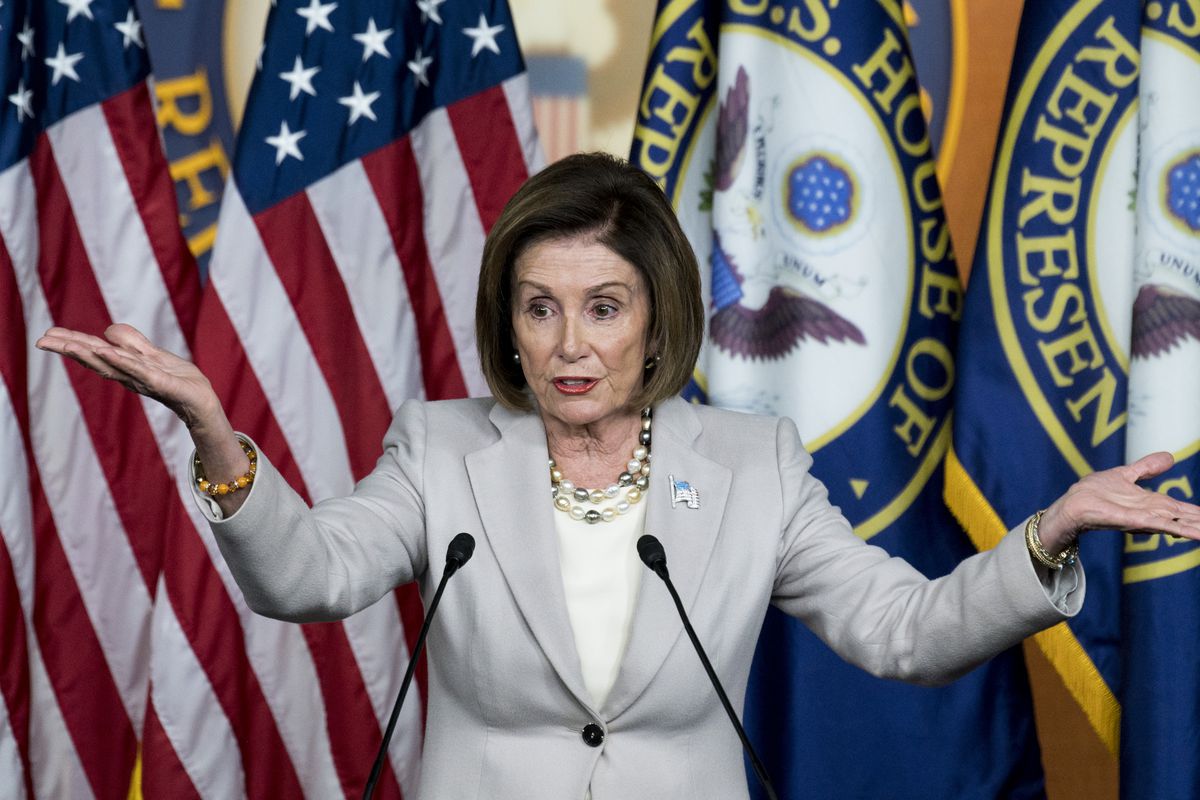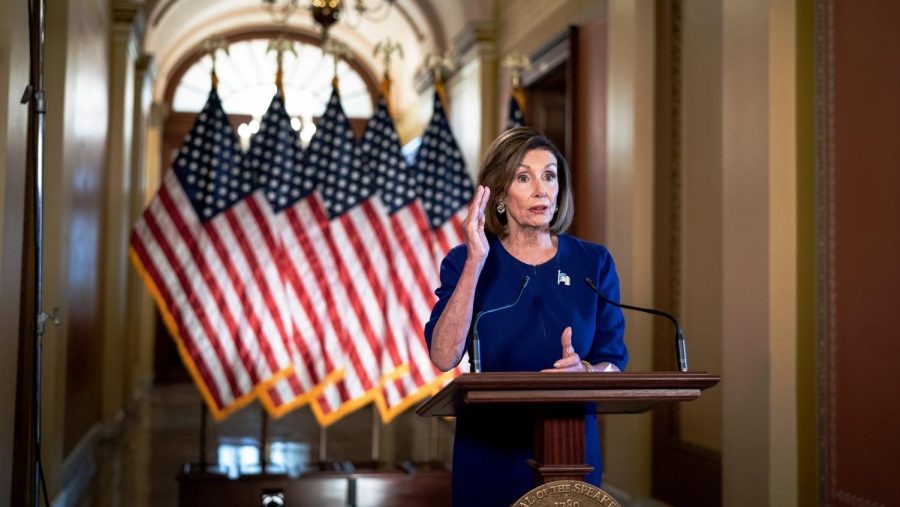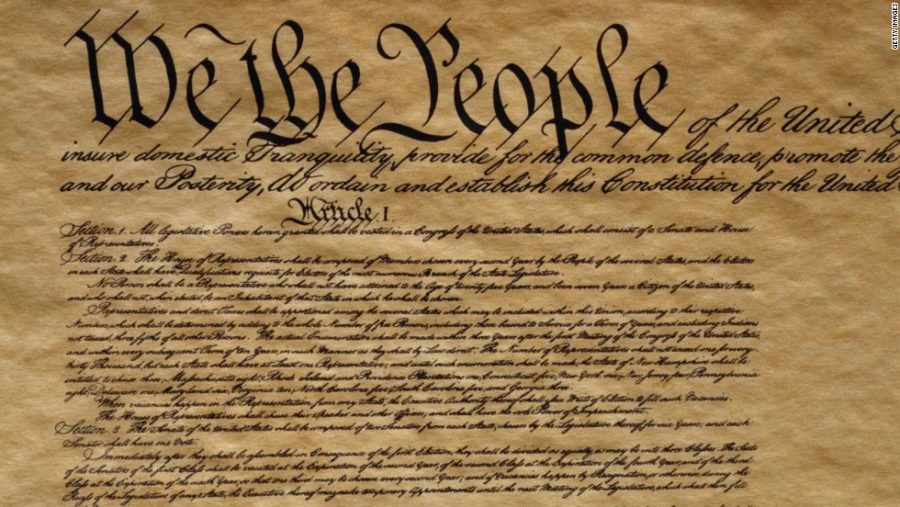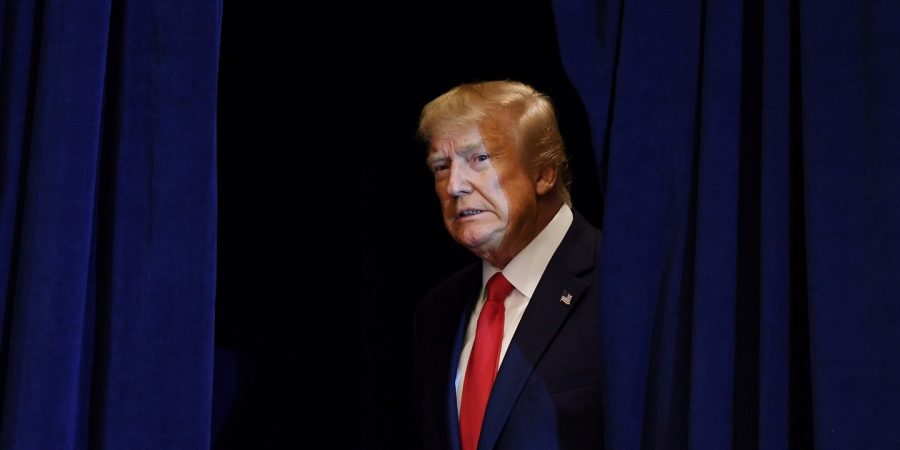The Impeachment Inquiry
Learn everything you need to know about impeachment.
October 17, 2019
House Speaker Nancy Pelosi (D-CA) began an impeachment inquiry on September 24.
Learn everything you need to know about the impeachment process, a history of impeachment in the United States, and reactions to Pelosi’s ongoing impeachment inquiry below.
The Impeachment Inquiry: Here’s What You Need to Know
House Speaker Nancy Pelosi announced a formal impeachment inquiry. Here’s what you need to know.
House Speaker Nancy Pelosi announced a formal impeachment inquiry against President Donald Trump on September 24, accusing him of violating the Constitution by seeking help from the president of Ukraine in order to damage Democratic presidential candidate Joe Biden in the upcoming 2020 elections. The Paw Print answered the most common questions concerning the inquiry below.
What needs to happen for Trump to be impeached?
Six House committees are currently investigating President Trump and will provide this information to the Judiciary Committee. The House of Representatives may vote to start an impeachment process. If the House votes to impeach a federal official, then it goes to the Senate. The Senate holds a trial and, afterward, the Senate votes on the articles of impeachment. Two-thirds or more of the Senate would need to vote to convict Trump in order to remove him from office. Vice President Mike Pence would then take office.
The current head of the Supreme Court is Chief Justice John Roberts. He would oversee the impeachment trial process.
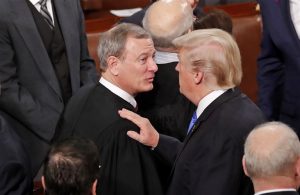
Chief Justice John Roberts pictured with President Trump.
Has Trump broken a law?
According to a rough transcript of a July 25 phone call, President Trump pressured Ukrainian President Volodymyr Zelensky to investigate Joe Biden, one of Trump’s political opponents. This would break a law “barring solicitations of foreign campaign contributions.”
However, impeachment is not technically about breaking the law. According to the Constitution, the president, vice president, and other high-ranking officials can be removed from office if they commit “high crimes and misdemeanors.”
“The president doesn’t have to have broken a law. If [the House of Representatives] thinks any person in the government is unfit to be in that office they can impeach them for any reason that they see fit,” said Gregory Gruszynski, a history teacher at Woodside High School.
How long will the impeachment process last?
The length of the impeachment process depends on the length of the various processes within the impeachment. The length of the investigation, House debate, Senate delay, and Senate trial all affect how long the process lasts.
If the process extends after the 2020 presidential elections and if Trump is re-elected, then he could still be removed from office during his second term.
Who (and what) is the “whistleblower”?
According to Merriam-Webster, a whistleblower is “an employee who brings wrongdoing… to the attention of a government or law enforcement agency.”
In the situation of the current impeachment, the first whistleblower is described as an individual in the intelligence community. The whistleblower notified the Inspector General of the Intelligence Community, Michael Atkinson, with the complaint of Trump’s phone call with the Ukrainian leader. There is also said to be a second whistleblower who has recently provided more information and who is described as having greater involvement. According to ABC News, the second whistleblower has first-hand knowledge of some of the allegations provided in the original complaint and has also been interviewed by Atkinson.
The identities of the whistleblowers remain unknown; whistleblower identities are protected under the Whistleblower Act, which was enacted to protect those who disclose information to Congress.
Have other presidents been impeached?
Two presidents have been impeached in the past: Andrew Johnson and Bill Clinton. The House also began the impeachment process against President Richard Nixon, but Nixon resigned before the process was complete.
“It became clear that [Nixon] was going to be impeached, so that is why he resigned,” said Gruszynski.
The major political scandal, Watergate, led to Nixon’s resignation after it was discovered that he and members of his administration were guilty of bugging the offices of the Democratic National Committee Headquarters and using the FBI and CIA to investigate political opponents and activist groups. The political climate of the 1970s was significantly less polarized than the current climate, so it was clear to Nixon that he would be removed from office.
Is Trump likely to be impeached?
No, but it’s possible. Currently, the Democrats control the House, but Republicans control the Senate. The House has already voted to start an impeachment inquiry, but, even if they vote to impeach, in order to remove Trump from office, the majority of the Senate must vote to convict him. Because the Republicans currently control the Senate, it is unlikely that the majority will vote to remove him from office.
“It’s really very divided in a partisan sense,” said Gruszynski. “The Republicans, for the most part, are standing with the current president, but there are a couple of people who sound like they may have defected.”
A Brief History of U.S. Impeachment
Our current political climate can be confusing; two Woodside History teachers help clarify what’s going on.
The U.S. Constitution serves as the guideline for most of our current political procedures.
With numerous accusations against President Donald Trump surfacing every week and impeachment proceedings already underway, many people are wondering what will happen in the next few months. Thankfully, resources like the internet (and two helpful Woodside U.S. History teachers) are full of information about impeachment’s history, allowing Americans to make predictions about what could happen next.
In regards to the impeachment process itself, U.S. History teacher Diane House gave thoughtful details.
“It’s all spelled out in the Constitution,” said House. “Essentially, the House [of Representatives] investigates and then passes what are called ‘Articles of Impeachment.’” While these Articles of Impeachment are written similarly to criminal indictments (accusations of criminal activity), they don’t have to be focused on criminality.
“‘High crimes and misdemeanors’ is the term,” said House, referencing the section of the Constitution describing what government officials can be accused of. As stated in the Constitution itself, “The President, Vice President and all civil Officers of the United States, shall be removed from Office on Impeachment for, and Conviction of, Treason, Bribery, or other high Crimes and Misdemeanors.” Basically, any member of the U.S. national government can be impeached for betraying their country, bribing people, or committing “high crimes and misdemeanors.”
House then elaborated: “[‘High crimes and misdemeanors’] is a very vague term, so it’s whatever the House thinks it means.” While the House of Representatives is traditionally expected to interpret “high crimes and misdemeanors” on their own, misuses of power are most commonly thought to be within the phrase’s definition.
After the majority of the House of Representatives votes to pass the Articles of Impeachment, the president is technically “impeached.” Then, a trial (similar to a criminal trial in which the Senators are the jurors) is started in the Senate to decide if the president will be removed from office – two-thirds of the Senate needs to vote in favor of the president’s removal in order for it to happen. The Chief Justice of the Supreme Court presides; today, this person would be John Roberts.
In 1868, the first impeachment followed these rules well. At the time, the Republican Party was intensely focused on helping former slaves achieve equal rights, and President Andrew Johnson’s lax approach to dealing with former slaveholders stirred up controversy. The fact that Johnson had only been made president by way of Abraham Lincoln’s assassination (Johnson was Lincoln’s Vice President) also added to the unrest.
“Andrew Johnson was what you would call a ‘moderate Southerner’… He wanted to let [Southerners] off the hook and let them start the KKK,” said Greg Gruszynski, a U.S. History teacher. “The radical Republicans… impeached him because they didn’t agree with what he was doing politically.”
Despite being impeached, Johnson was allowed by the Senate to stay in office. It would be 131 years until another president – Bill Clinton – would go through the same process.
“[Clinton’s impeachment] started with Whitewater [a scandal involving alleged illegal financing]… but then it evolved into an investigation about whether he had an affair,” said Gruszynski.
The affair in question was with Monica Lewinsky, an intern at the White House from 1995-1996; she spoke out about the affair nine times from 1995-1997, and, in 1998, an official investigation was opened into her relationship with Clinton. In denying the allegations, Clinton created lies that let his opponents accuse him of perjury in his Articles of Impeachment (however, the Senate voted to keep him in office).
“In the context of our current president, that just seems absurd – that somebody would be impeached for that compared to all of the lies that our current president tells,” said Gruszynski.
However, House believes that the Clinton impeachment is very similar to what is currently happening to Trump. Through comparison, she predicted the outcome of the current impeachment proceedings.
“The House will recommend Articles of Impeachment, and they will probably look exactly like the ones that they had for Clinton,” said House. “[There will] be probably an Abuse of Power, Obstruction of Justice… [and] Obstruction of Congress because [the Trump administration is] not turning evidence over.”
Reactions to the Impeachment Inquiry
The country had divided reactions over the announcement of the impeachment investigation.
President Trump’s impeachment inquiry received mostly positive reviews locally but mixed reactions on a larger scale.
The impeachment investigation, while contentious nationwide, received little backlash at Woodside, though some progressives see it as a misstep of the Democratic Party.
After a whistleblower complaint detailing a call between President Trump and Ukraine President Volodymyr Zelensky was released, the Democrat-controlled House began an impeachment investigation. Many Woodside students voiced their support.
“I think [the investigation] may possibly be warranted,” said Ronan Morrill, a Woodside senior. “This is not a partisan issue, because the integrity of the electoral process is at stake.”
Though some progressives disagree with Morrill’s assessment, they claim impeachment does not solve the failings of the government. Some speculate that impeaching Trump will give a false sense of accomplishment to Democrats; his policies are still in effect and little will have changed.
“If we don’t begin to address the underlying… disenfranchisement and rage, and legitimate rage, on the part of the white working class … impeachment itself will rip the fabric of American society further into antagonistic tribes,” commented Pulitzer Prize winning journalist Chris Hedges.
However, nationwide, opinions are not so progressive.
“[The whistleblower] is a deep state operative, pure and simple,” Stephen Miller, a White House political aid stated.
While a CNN poll found that 51 percent of the country is in favor of impeachment investigations and 44 percent are opposed, Trump’s base has remained firm in its support of the President. Republican officials have generally been against the investigation, but some Republicans, such as Congressman Mark Amodi, indicated tentative support.
When asked whether he supports the investigation, Amodi said, “Let’s put it through the process and see what happens.”
A spokeswoman for Amodi later clarified that Amodi supports the “oversight process” but not an inquiry. Trump has continued calls to end the impeachment inquiry.
In a tweet, President Trump expressed his displeasure with the investigation: “If that perfect phone call with the President of Ukraine isn’t considered appropriate, then no future President can EVER again speak to another foreign leader!”
“If the things they say he has done are true, I think those are not acceptable at all,” said Woodside junior Gavin Feri. “It’s just not something you should do as a president.”
President Trump Accuses Leading Democratic Candidate of Corruption
In the light of allegations that President Donald J. Trump abused his power in Ukraine, President Trump has raised accusations against Democratic presidential candidate Joe Biden, claiming Biden used his influence as former vice president to help his son gain a position at the Ukrainian gas company Burisma.
The press has repeatedly tried to interview President Trump on the nature of his own relations with Ukraine, yet President Trump has insisted on further investigation of Biden.
When questioned about a phone call he made with Ukraine, President Trump instead claimed, “What Biden did for his son [is] something they should be looking at.”
Democrats have refuted these accusations, but Woodside junior Gavin Feri sees no harm in proceeding with an investigation of Biden.
“Why would [Democrats] be making such a big deal out of it?” wondered Feri. “It’s just an investigation.”
Some Democrats argue that President Trump’s accusations are an attempt to not only deflect attention from himself but also disturb Biden’s presidential campaign.

“I’m not going anywhere,” said Biden in a response to Trump’s claims. “You are not going to destroy me, and you’re not going to destroy my family.”
Still, the Democratic Party does not uniformly support Biden; some call for investigations of both President Trump and Biden.
“I don’t know if [Biden] did or didn’t, but he does seem shady,” commented Cassidy Creighton, a Woodside Democrat. “[Trump] calling Ukraine is probably fair for a president, but him threatening them [is]… definitely an impeachable offense.”
Woodside Democrat Joseph Cigarollo agrees.
“Trump needs to focus on the people,” stated Cigarollo. “But, I think there should be an investigation.”
